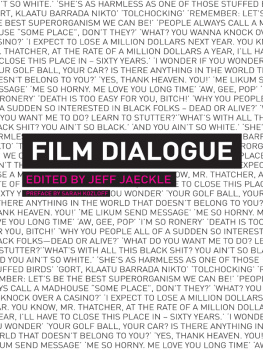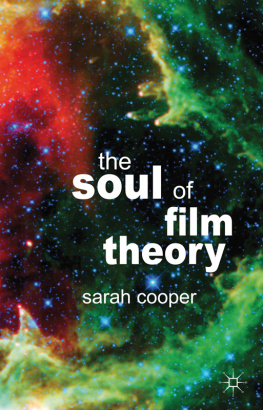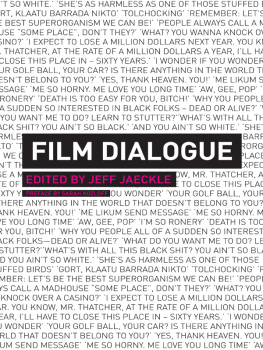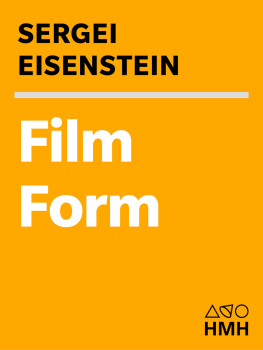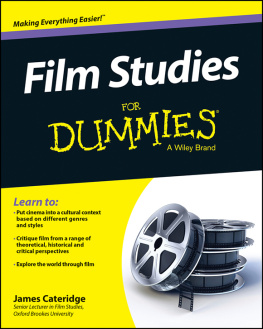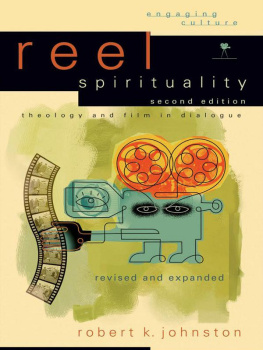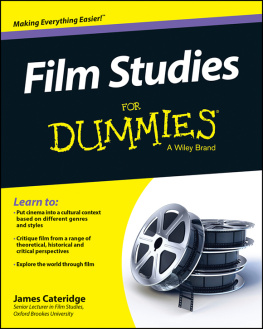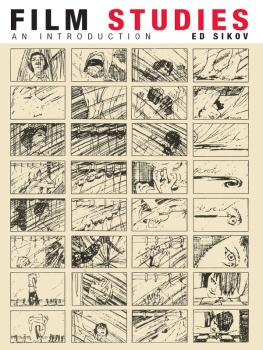FILM DIALOGUE
FILM DIALOGUE
EDITED BY JEFF JAECKLE
| WALLFLOWER PRESS
LONDON & NEW YORK |
A Wallflower Press Book
Published by
Columbia University Press
Publishers Since 1893
New York Chichester, West Sussex
cup.columbia.edu
Copyright Jeff Jaeckle, 2013
All rights reserved.
E-ISBN 978-0-231-85042-1
Wallflower Press is a registered trademark of Columbia University Press
A complete CIP record is available from the Library of Congress
ISBN 978-0-231-16562-4 (cloth : alk. paper)
ISBN 978-0-231-16563-1 (pbk. : alk. paper)
ISBN 978-0-231-85042-1 (e-book)
Cover image:
Design by Elsa Mathern
A Columbia University Press E-book.
CUP would be pleased to hear about your reading experience with this e-book at .
acknowledgments
Film Dialogue is the product of dozens of people who directly and indirectly aided its progress over an unexpectedly protracted period of six years. Conference talks by Sarah Kozloff, Tom Leitch, Jeremy Strong and Emily Bauman established the books scopes and aims, while conversations with Mike Chasar, Nick Hengen Fox and Deb Carmichael improved its tone and clarity. I am grateful to Vivian Sobchack and Rutgers University Press for allowing me to reprint a portion of Screening Space. My greatest debts of gratitude are to Yoram Allon, for supporting the project from the beginning, and Jodie Taylor, for shepherding me through each phase of the production process. Sarah Kozloff and Todd Berliner inspired this book, and their scholarship and mentorship continue to motivate me. Sarah assured me that obsessions with film speech were worth indulging and listening to, while Todd showed me what good film criticism is and can do. I thank the contributors for their tireless patience, and hope they agree the wait was worth it. Finally, I am humbled by the love, humour and generosity that my partner Lynn Makau has shown during the course of this project and every day I have known her. This book would be impossible without her.
contents
SARAH KOZLOFF
JEFF JAECKLE
VIVIAN SOBCHACK
DEBORAH A. CARMICHAEL
PAUL WELLS
JEREMY STRONG
THOMAS LEITCH
TODD BERLINER
BRIAN WILSON
FRANOIS THOMAS
JEFF JAECKLE
EDWARD BUSCOMBE
HYE SEUNG CHUNG
STEPHANE DUNN
DONNA PEBERDY
Todd Berliner, Professor of Film Studies at the University of North Carolina Wilmington, teaches film aesthetics, film narration and American cinema. He is the author of Hollywood Incoherent: Narration in Seventies Cinema (University of Texas Press, 2010) and many articles and book chapters. Professor Berliner was the founding chairman of UNCWs Film Studies Department and the recipient of two Fulbright Scholar awards, including the Laszlo Orszagh Distinguished Chair in American Studies.
Edward Buscombe was formerly Head of Publishing at the British Film Institute. His books include Stagecoach (1992), The Searchers (2000) and Unforgiven (2004), all for the BFI Film Classics series. He has also edited the anthologies The Screen Education Reader: Cinema, Television, Culture (Columbia University Press, 1993) and British Television: A Reader (Oxford University Press, 2000). His most recent publication is Injuns!: Native Americans in the Movies (Reaktion Books, 2006).
Deborah A. Carmichael is the managing editor of the Journal of Popular Culture. She is the editor of The Landscape of Hollywood Westerns: Ecocriticism in an American Film Genre (University of Utah Press, 2006) and co-editor of All-Stars and Movie Stars: Sports in Film and History (University Press of Kentucky, 2008). She has also published on film exhibition history, Depression-era movies, and documentaries.
Hye Seung Chung is Assistant Professor of Film and Media Studies at Colorado State University. She is the author of Hollywood Asian: Philip Ahn and the Politics of Cross-Ethnic Performance (Temple University Press, 2006) and Kim Ki-duk (University of Illinois Press, 2012) as well as numerous articles on Korean cinema and Asian Americans in U.S. popular culture. Her writing has appeared in such journals as Asian Cinema, Cinema Journal, Historical Journal of Film, Radio, and Television, Journal of Film and Video, Journal of Popular Film and Television and Post Script.
Stephane Dunn is Assistant Professor in the Department of English and Co-Director of the Cinema, Television, & Emerging Media Studies Program at Morehouse College, Atlanta. She is the author of Baad Bitches & Sassy Supermamas: Black Power Action Films (University of Illinois Press, 2008), and her writings about film and contemporary cultural politics have appeared in periodicals such as the Chronicle of Higher Education, CNN.com, Ms., Bright Lights Film Journal, Screening Noir, Fire: Multimedia Journal of Black Cultural Studies, and books, including Disco Divas: Women and Popular Culture in the 1970s (University of Pennsylvania Press, 2003) and Communicating Marginalized Masculinities (Routledge, 2012).
Jeff Jaeckle holds a doctorate from the University of Texas-Austin and is currently Instructor of Composition/Literature at Portland Community College. His scholarship on film aesthetics, film adaptation and American cinema has appeared and has appeared in Film Quarterly, New Review of Film and Television Studies, Quarterly Review of Film and Video, MLA Approaches to Teaching Jack London and the Oxford Handbook of American Literary Naturalism.
Sarah Kozloff is Professor of Film at Vassar College. She is the author of Invisible Storytellers: Voice-Over Narration in American Fiction Film (University of California Press, 1988) and Overhearing Film Dialogue (University of California Press, 2000). Her articles have appeared in Cinema Journal, Literature/Film Quarterly, Journal of American Culture, Style, Journal of Popular Film and Television, Cinesonic: The World of Sound in Film (AFTRS, 1999), the Routledge Encyclopedia of Narrative Theory (Routledge, 2005), American Cinema of the 1940s: Themes and Variations (Rutgers UP, 2006) and From Hobbits to Hollywood: Essays on Peter Jacksons Lord of the Rings (Rodopi, 2006).
Thomas Leitch is Professor of English and Director of Film Studies at the University of Delaware. He is the author of What Stories Are: Narrative Theory and Interpretation (Penn State University Press, 1986), Find the Director and Other Hitchcock Games (University of Georgia Press, 1991), The Encyclopedia of Alfred Hitchcock (Facts on File, 2002), Crime Films (Cambridge University Press, 2002), Perry Mason (Wayne State University Press, 2005), and Film Adaptation and Its Discontents: From Gone With the Wind to The Passion of the Christ (Johns Hopkins University Press, 2007), and, with Leland Poague, A Companion to Alfred Hitchcock (Wiley-Blackwell, 2011).
Donna Peberdy is Senior Lecturer in Film and Television Studies at Southampton Solent University, UK. She is the author of Masculinity and Film Performance: Male Angst in Contemporary American Cinema (Palgrave MacMillan, 2011) and co-editor of Tainted Love: Screening Sexual Perversities

